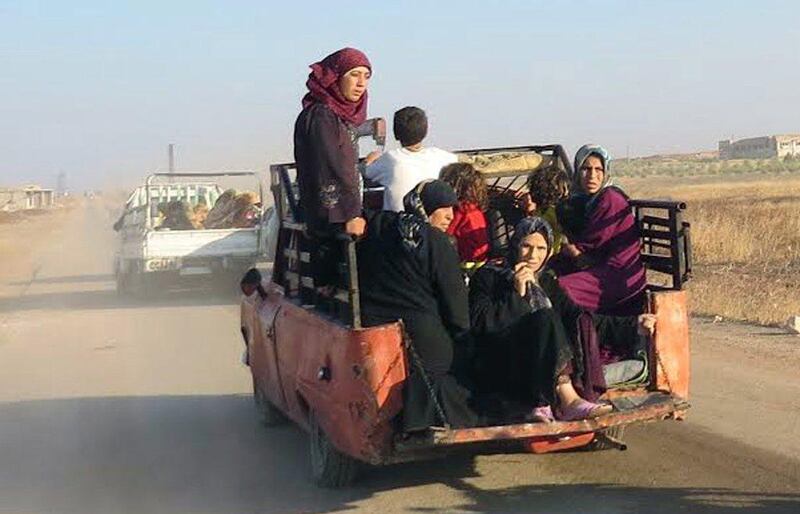BEIRUT // Syria’s government secured a deal to restore its authority over another rebellious Damascus suburb on Thursday while Syrian rebels captured new ground in a lightning advance on the central city of Hama.
The Syrian capital’s western suburb of Moadamiyeh, which a UN report said was gassed with toxic sarin in 2013, has suffered a three-year government siege, leaving its estimated 28,000 residents with dwindling food and medical supplies.
On Thursday, Moadamiyeh’s residents agreed to let president Bashar Al Assad’s government restore its security presence and political institutions in the suburb, according to Hassan Ghadour, a resident and leading negotiator of the deal.
Mr Ghadour said 200 gunmen who did not wish to give up their arms would be allowed safe passage to rebel-held areas in Syria’s northwestern Idlib and Aleppo provinces. Implementation of the agreement is expected to begin on Friday.
A local activist, Dani Qappani, said the residents had had no desire to negotiate with Mr Al Assad’s government but that their “circumstances grew too difficult”.
Elsewhere in Syria, at least 25 civilians, including six children, were killed on Thursday in suspected government airstrikes on Hama province as rebels made new gains there, activists said.
The Hama-based Syrian Press Centre, an activist group operated by Ahmed Al Ahmed, said at least 10 people were killed when warplanes struck a crowd of people displaced from Suran, a town north of the city of Hama, which was seized by opposition fighters. Another 15 people were killed further to the west, the centre said.
The rebel offensive is led by an ultraconservative Islamic group, Jund Al Aqsa, and several factions from the Free Syrian Army. In the past three days, the insurgents have pushed their way from the north of the province, where they are usually based, south toward government-held areas.
Mr Al Ahmed said the rebels were only 8 kilometres away from the provincial capital, Hama. They have taken over a government military base and control several towns along the main road linking Hama to Damascus, following a “surprising” government retreat, he said.
The advances in Hama are significant because if rebels control the city and the main road to Damascus then they can sever government supply lines and deprive Mr Al Assad of a traditional stronghold. Fighting is now concentrated around a hill outside the city of Hama, Mr Al Ahmed added.
Mr Al Ahmed, who spoke from Turkey, said government forces in Hama province may have been weakened because many troops were transferred to the city of Aleppo, where they are bogged down in vicious fighting with advancing rebels.
The Syrian Observatory for Human Rights, a UK-based opposition group, confirmed the rebels’ advance and said a series of airstrikes since early Thursday had killed at least 25 civilians, including six children, in the northern province of Hama.
Syria’s state news agency, Sana, said government warplanes had killed 10 “terrorists” in northern Hama.
At a press conference in Geneva, the UN envoy to Syria warned of the government’s use of siege tactics to force evacuations of residents from specific areas, citing the example of Daraya, a neighbouring suburb of Moadamiyeh that surrendered to the government.
“After Daraya, we may have other Darayas,” Staffan de Mistura said.
Government forces kept Daraya under tight siege for four years after the suburb evicted security forces in 2012, and ultimately secured an agreement for the estimated 6,000 remaining civilians to leave the area last week. Mr de Mistura acknowledged that such examples, if repeated, could amount to a “strategy” that is taking place.
Mr de Mistura’s humanitarian adviser, Jan Egeland, said the UN humanitarian task force for Syria “failed the people of Daraya”. He warned that sieges on Al Waer in Homs and Madaya, near Damascus, could force similar exoduses.
The UN envoy also said he was preparing “a quite clear political initiative” to help revive the stalled Syria peace talks aimed at resolving the country’s devastating war, now in its sixth year. Mr de Mistura said the “important” initiative will come ahead of a planned September 21 meeting on Syria during the UN General Assembly ministerial meeting in New York.
The envoy had hoped to resume talks between Mr Al Assad’s government and the main opposition group in August, having set two target dates during the month. He suspended the talks in April amid renewed fighting.
Also on Thursday, the Russian foreign ministry said that foreign minister Sergei Lavrov had discussed cooperation in Syria with his US counterpart, John Kerry, over the phone.
The two men failed to reach a deal at a marathon meeting last week.
* Associated Press





